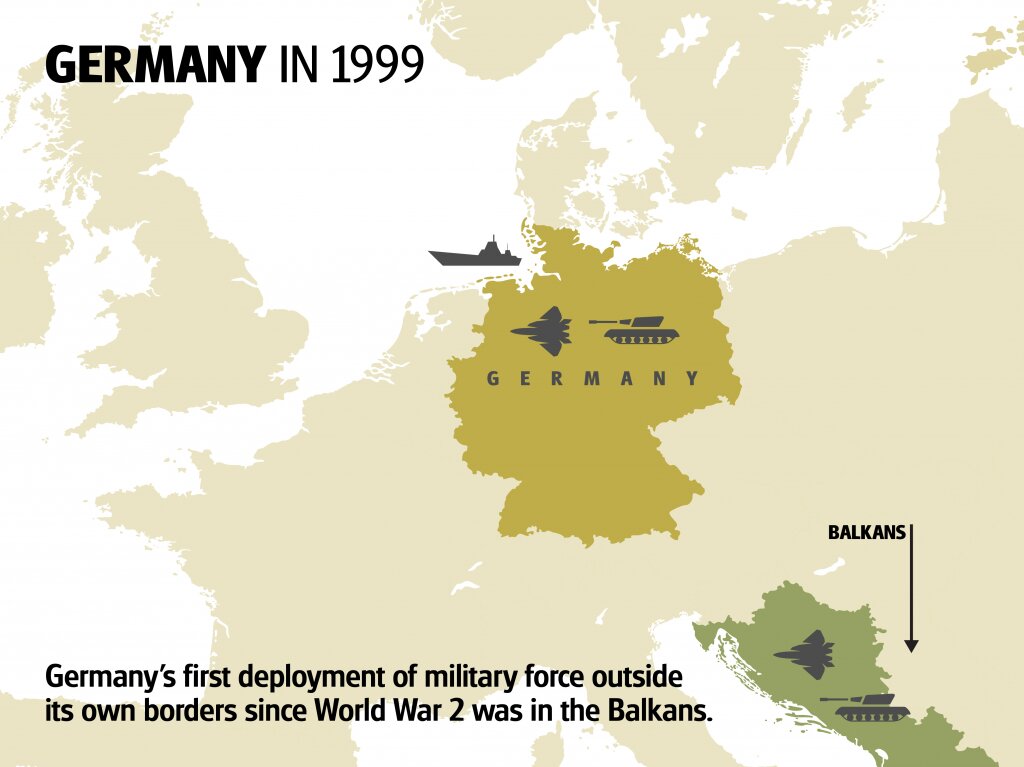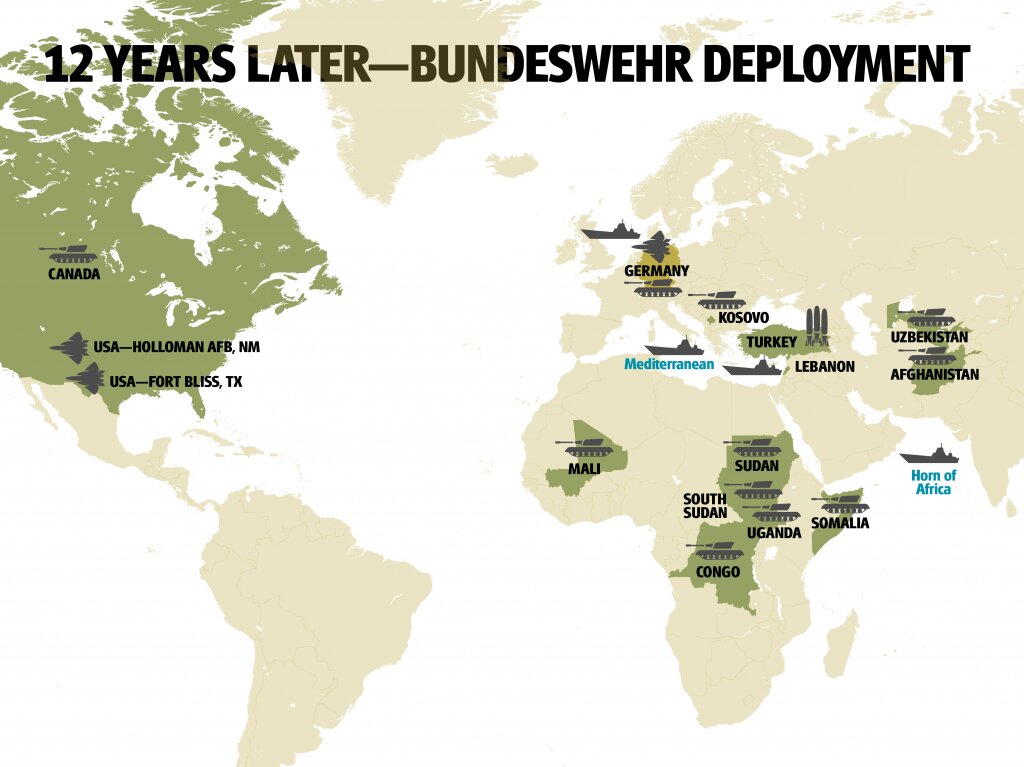
Did Germany Support Syria’s Chemical Weapons Program?
The German government admitted last month to delivering chemicals necessary for the production of chemical weapons, reported German-Foreign-Policy.com. “Most recent indications point to the implication of German companies having possibly participated in the establishment of Syrian facilities for the production of chemical weapons,” it wrote.
Now, German government advisers are pushing for Bundeswehr participation in an eventual United Nations mission to disarm Syria of the very weapons Germany may have helped provide.
Peer Steinbrück, who recently lost to Angela Merkel in elections for the German chancellorship, blasted the government last year for its leadership and dominance of global arms exports. “The former finance minister, nominated to lead the Social Democrats (spd) into September’s election against Merkel, said it was a scandal that Germany has become the world’s third-largest arms exporter on her watch,” Reuters reported. “Arms exports are a sensitive issue in Germany due to its Nazi past and the role arms makers such as Krupp played in stoking 19th- and 20th-century wars with exports to both sides.”
Germany is the largest exporter of military armaments in Europe and third in the world behind the United States and Russia. The Arms Export Report 2011, released by the German government in November, reveals Berlin’s shocking geographic reach, international partnerships and foreign policy relating to its armaments industry.
Arabian Gulf states appear prominently in the report, underscoring German influence in arming these authoritarian countries as an iron arc in opposition against Iran. Trusted purchase partners such as the United Arab Emirates, Saudi Arabia, Kuwait, Qatar and Bahrain all have ordered sizable amounts of hardware.
The report revealed a total of €5.4 billion (us$7.3 billion) in export authorizations approved by Germany’s Federal Security Council, up from €4.8 billion in 2010. “German arms exports have nearly doubled since the end of the 1990s,” reported German-Foreign-Policy.com (Nov. 16, 2012).
However, once unreported sales are included, the picture becomes even more frightening.
As German-Foreign-Policy.com astutely noted, glaringly missing from the report were arms produced under German license in associated countries stretching from Europe to the Gulf states, as well as tank sales to Saudi Arabia and Qatar—estimated at €10 billion—and the delivery of tanks and infantry vehicles to Indonesia, projected at €6 billion. Adding these line items to the reported €5.4 billion, the 2011 report could more accurately total €21.4 billion (us$28.9 billion)!
German-Foreign-Policy.com wrote (ibid):
Last October, in her speech to some 250 civilian and military leaders at this year’s Bundeswehr conference in Strausberg (Brandenburg), the German chancellor explained the booming arms exports’ political function. “All available instruments” must be networked for Berlin’s global policy, Merkel said: “economic policy, development policy, diplomatic, police, and military measures must proceed hand in hand.” Potentials of allies must also be used—not only those of nato and the EU allies, but also those of “other actors,” who should be “encouraged” to enhance their engagement for “security and liberty.” And she promised support: “Whoever feels committed to maintaining peace”—like Germany—“but cannot play an active role throughout the world,” should now be “called upon to help trustworthy partners” so that they can “assume corresponding responsibilities.” This includes support in military training and the supply of the necessary military hardware.
What was clear from the report is the impact of the scope of the actual and potential hostilities in the Middle East and Asia upon German arms exports, which was reflected in the 2011 report and is only set to be exceeded in future reports.
It’s hard to conceive that Germany, shattered amid rubble after the Allied invasion during World War ii, exports more military hardware than any other European country today. This fact alone has foreboding historical overtones. Under the perceived dove-like administration of Angela Merkel’s coalition government, the results of this report, and the sales that have been omitted, reveal a “hawkish” military industrial powerhouse exporting hardware unchecked across Europe, the Middle East, Africa and Asia.
The U.S., Britain, United Nations and nato have forgotten the words of Franklin Roosevelt and Winston Churchill at the end of World War ii in their joint declaration: “It is our inflexible purpose to destroy German militarism and Nazism and to ensure that Germany will never again be able to disturb the peace of the world.”
They didn’t stop with that, but continued, “We are determined to disarm and disband all German armed forces, break up for all time the German General Staff that has repeatedly contrived the resurgence of German militarism; remove or destroy all German military equipment; eliminate or control all German industry that could be used for military production.”
“It is not our purpose to destroy the people of Germany,” wrote the two world leaders, “but only when Nazism and militarism have been extirpated will there be hope for a decent life for Germans and a place for them in the community of nations.”
What few point to in this whole scenario is the hard reality that Germany’s armaments industry could so easily turn its production to self-consumption of its wares, rather than exports. The last time that occurred, it spelled disaster for the world.
This time Germany already has its allies consuming its military hardware, dependent on it for spare and replacement parts, for upgrades and for the training of their military personnel in the usage of its weaponry. By redirecting these resources, Germany could arm itself to the teeth, thus becoming not only the world’s third-largest producer of military hardware, but the third-largest user of the same, replete with imperial alliances with many of its existing foreign customers, who are in turn armed with German weaponry.

One other fact seems to escape most observers of the German scene today. Hitler launched a world war having occupied only the periphery around his nation—the Rhineland, the Sudetenland, Austria and Czechoslovakia.
Since Germany, in concert with the Vatican, stimulated the Balkan wars of the 1990s—resulting in the first aggressive post-World War ii military action by that nation—it has progressively mounted military missions in 13 separate foreign theaters.
German military deployment today reveals the reality that today Germany is far more strategically placed to initiate sudden imperialist aggression than Hitler ever was back in 1939.

All it lacks is the type of charismatic, imperialist leadership to initiate it.
Germany may well continue for a short while to appear the dove in European foreign policy under Merkel’s motherly leadership amid deepening continental and world crisis. But not for long.
The postwar view that Germans have long held of themselves is changing, as is the view of their European neighbors, and the mood is turning ugly. It’s under such conditions that populist leaders tend to rise in Germany.
The Prophet Daniel wrote of a powerful end-time leader’s imminent arrival amid today’s crisis. He is described as fierce in physical appearance and devious in dark political lobbying. He appears one way to Germans and Europe’s citizens, only, in reality, to be the opposite: a wolf in sheep’s clothing, leaving devastation in his wake via a deceptively crafted policy of peacekeeping that hides the true nature of a Holy Roman imperial motive.
Trumpet editor in chief Gerald Flurry has long warned readers, “The Daniel 8 man is going to change the German landscape—economically, politically and militarily. Germany needs a man for emergencies. What we see developing now is just such an emergency, and Germany is about to bring that man to power. This is what’s just ahead of us!”
Again we remind you, as Herbert W. Armstrong did beginning in 1934: A world dictator is about to appear! A strong man in Europe is about to arise. Then watch for the unleashing of the powerful military potential that the German armaments industry has steadily built to such a dominant level.
